-
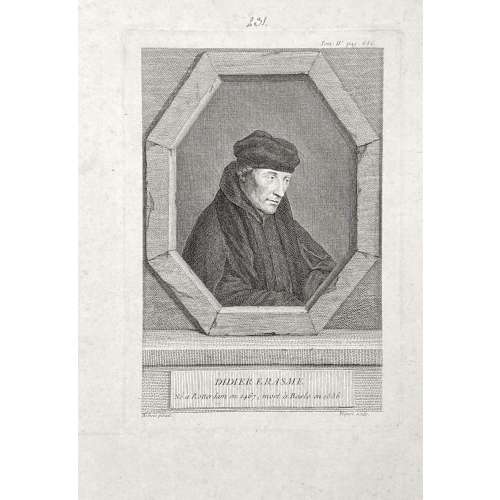 The portrait of Erasmus of Rotterdam (1466 – 1536), half-length, head to the right, body facing right, looking away, in a trompe-l'oeil octagonal frame. Inscriptions: Top right: Tom IV, pag. 686. Center of the image: DIDIER ERASME / Ne a Rotterdam en 1467, mort a Basle en 1536. Bottom of the plate: Holbein pinxit | Flipart Sculp. From the book Histoire générale des Provinces-Unies by Bénigne Dujardin (French, 1689 – 1771?) and Gottfried Sellius (real name Gottfried Sell) (1704? – 1767), published in 1757 in Paris by P. G. Simon. Volume 4, facing p. 686. Size: Sheet: 25 x 17.5 cm; Plate: 19.5 x 13.5 cm; Image: 18 x 12 cm. References: (1) Van Someren v.2, p.249, №1688; (2) https://archive.org/details/histoiregnra04duja/page/n714/mode/2up. Inscription above the plate: nut ink, hand, "231".
The portrait of Erasmus of Rotterdam (1466 – 1536), half-length, head to the right, body facing right, looking away, in a trompe-l'oeil octagonal frame. Inscriptions: Top right: Tom IV, pag. 686. Center of the image: DIDIER ERASME / Ne a Rotterdam en 1467, mort a Basle en 1536. Bottom of the plate: Holbein pinxit | Flipart Sculp. From the book Histoire générale des Provinces-Unies by Bénigne Dujardin (French, 1689 – 1771?) and Gottfried Sellius (real name Gottfried Sell) (1704? – 1767), published in 1757 in Paris by P. G. Simon. Volume 4, facing p. 686. Size: Sheet: 25 x 17.5 cm; Plate: 19.5 x 13.5 cm; Image: 18 x 12 cm. References: (1) Van Someren v.2, p.249, №1688; (2) https://archive.org/details/histoiregnra04duja/page/n714/mode/2up. Inscription above the plate: nut ink, hand, "231". -
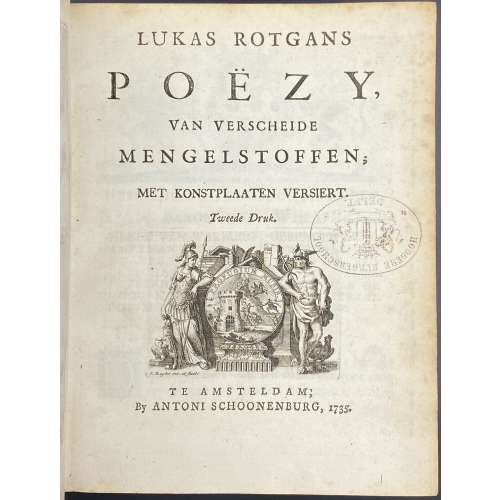 Title-page: LUKAS ROTGANS | POËZY, | VAN VERSCHEIDE | MENGELSTOFFEN; | MET KONSTPLAATEN VERSIERT. | Tweede Druk | {vignette} | TE AMSTERDAM; | By ANTONI SCHOONENBURG, 1735. || Collation: 4to; fep, 1st blank, engraved t.p. by M. Pool, t.p., *3,4; 2*-9*4, 10*1, *LII2, *LII, 10*2 —> *-10*4 (40 leaves); A-Z4, 2A-2Z4, 3A-3Z4, 4A-4Q4, last blank, fep; (340 leaves), 2 plates extraneous to collation. Pagination: [2] [1-5] 6-14 [15-80] [1-3] 4-680 [2], 2 unsigned plates not included in pagination after pp. 634 and 652, 50 headpieces by Jacob Folkema after Arnold Houbraken, and 2 tailpieces by Jan de Ruijter. Marks: Armorial bookplate: “Ex Libris J. J. Mak | {coat of arms} | Inveni Intermanere Melius”. Oval ink stamp: “HOOGERE BURGERSCHOOL. | DELFT” Provenance: Johannes Jacobus Mak (Dutch, 1908 – 1975). Edition: 2nd, 1st edition published in 1715 in Leeuwarden by François Halma. Contributors: Lukas Rotgans (Dutch, 1653 – 1710) – author. Arnold Houbraken (Dutch, 1660 – 1719) – artist. Jacob Folkema (Dutch, 1692 – 1767) – engraver. Matthijs Pool (Dutch, 1676 – 1740) – engraver. Jan de Ruijter (Dutch, 1688 – 1744) – engraver. Antoni Schoonenburg (Dutch, 1682 – 1754) – publisher.
Title-page: LUKAS ROTGANS | POËZY, | VAN VERSCHEIDE | MENGELSTOFFEN; | MET KONSTPLAATEN VERSIERT. | Tweede Druk | {vignette} | TE AMSTERDAM; | By ANTONI SCHOONENBURG, 1735. || Collation: 4to; fep, 1st blank, engraved t.p. by M. Pool, t.p., *3,4; 2*-9*4, 10*1, *LII2, *LII, 10*2 —> *-10*4 (40 leaves); A-Z4, 2A-2Z4, 3A-3Z4, 4A-4Q4, last blank, fep; (340 leaves), 2 plates extraneous to collation. Pagination: [2] [1-5] 6-14 [15-80] [1-3] 4-680 [2], 2 unsigned plates not included in pagination after pp. 634 and 652, 50 headpieces by Jacob Folkema after Arnold Houbraken, and 2 tailpieces by Jan de Ruijter. Marks: Armorial bookplate: “Ex Libris J. J. Mak | {coat of arms} | Inveni Intermanere Melius”. Oval ink stamp: “HOOGERE BURGERSCHOOL. | DELFT” Provenance: Johannes Jacobus Mak (Dutch, 1908 – 1975). Edition: 2nd, 1st edition published in 1715 in Leeuwarden by François Halma. Contributors: Lukas Rotgans (Dutch, 1653 – 1710) – author. Arnold Houbraken (Dutch, 1660 – 1719) – artist. Jacob Folkema (Dutch, 1692 – 1767) – engraver. Matthijs Pool (Dutch, 1676 – 1740) – engraver. Jan de Ruijter (Dutch, 1688 – 1744) – engraver. Antoni Schoonenburg (Dutch, 1682 – 1754) – publisher. -
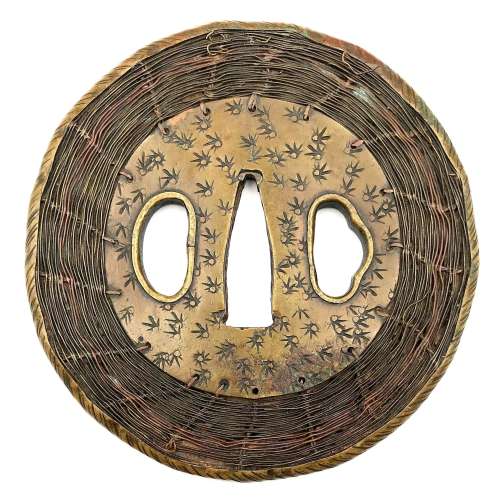 Shingen school (or style) tsuba of round form with iron core and web, covered with a thin brass plate decorated with star-shaped punch marks. The rim of tsuba is a brass nawame-fukurin. Between the central brass plate and the rim there is woven wire of brass and copper in a basketweave pattern. Both hitsu-ana have raised rim. Traces of oxidation. Unsigned. Edo period, 18th century. Size: Height: 88.4 mm, Width: 86.6 mm, Thickness at seppa-dai: 4.6 mm. Weight: 132.4 g. Robert E. Haynes in his "Study Collection of Japanese Sword Fittings. Nihon Art Publishers, 2010" on p. 117 says: "Brass outer plate of round shape. This tsuba has an iron core tsuba of spoke form as made by Saotome school, ca. 1500. There are brass plates on either side connected to the rim by woven brass and shakudō wire. The wire has been hand drawn, which is very difficult. The hitsuana are brass lined and the rim has a brass cover. This type of tsuba is referred to as a Shingen tsuba. This is a reference to Takeda Shingen Harunobu (1521-1573), the great and famous daimyō." For reference see the MFA collection. A look-a-like tsuba is illustrated in Compton Collection, vol. 2, p. 26-27, №52:More details and examples can be found at: http://varshavskycollection.com/shingen-tsuba/
Shingen school (or style) tsuba of round form with iron core and web, covered with a thin brass plate decorated with star-shaped punch marks. The rim of tsuba is a brass nawame-fukurin. Between the central brass plate and the rim there is woven wire of brass and copper in a basketweave pattern. Both hitsu-ana have raised rim. Traces of oxidation. Unsigned. Edo period, 18th century. Size: Height: 88.4 mm, Width: 86.6 mm, Thickness at seppa-dai: 4.6 mm. Weight: 132.4 g. Robert E. Haynes in his "Study Collection of Japanese Sword Fittings. Nihon Art Publishers, 2010" on p. 117 says: "Brass outer plate of round shape. This tsuba has an iron core tsuba of spoke form as made by Saotome school, ca. 1500. There are brass plates on either side connected to the rim by woven brass and shakudō wire. The wire has been hand drawn, which is very difficult. The hitsuana are brass lined and the rim has a brass cover. This type of tsuba is referred to as a Shingen tsuba. This is a reference to Takeda Shingen Harunobu (1521-1573), the great and famous daimyō." For reference see the MFA collection. A look-a-like tsuba is illustrated in Compton Collection, vol. 2, p. 26-27, №52:More details and examples can be found at: http://varshavskycollection.com/shingen-tsuba/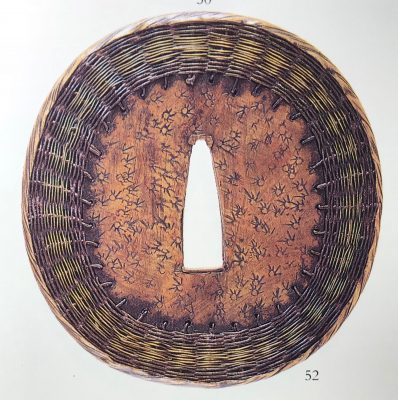
Compton Collection, vol. 2, p. 26-27, №52.
-
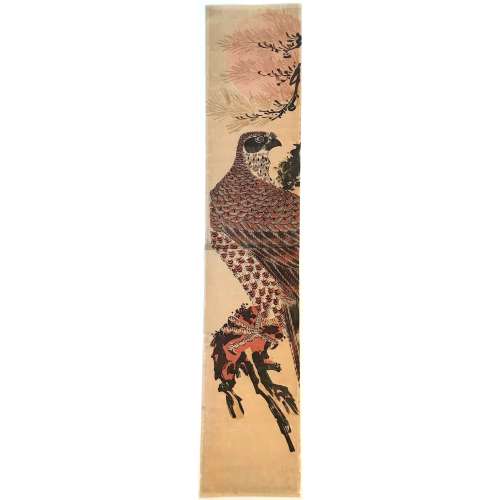 The print lacks signature. It is attributed by some to Suzuki Harunobu and by the others to Isoda Koryūsai.
The print lacks signature. It is attributed by some to Suzuki Harunobu and by the others to Isoda Koryūsai.Attributed to Koryūsai: Pins #517/p.209, c. 1775 [AIC II: Clarence Buckingham Collection, 1925.2772], Ukiyo-e Taisei IV; Vignier & Inada, 1911; Ritsumeikan University Z0165-239.
Attributed to Harunobu: Pins #239/p.132.; BM 1906,1220,0.85;
-
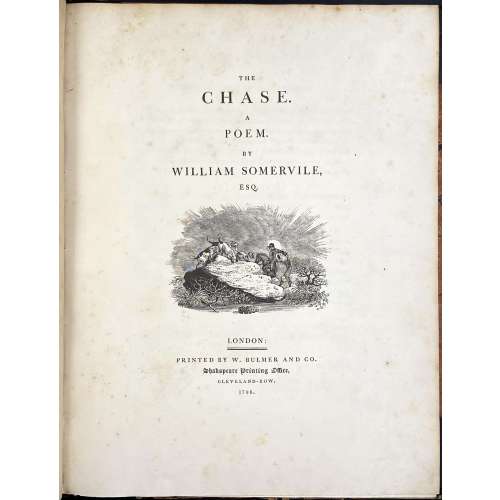 Royal 4to, 29.8 x 23.5 cm, contemporary half brown morocco, marbled boards gilt ruled, spine with gilt-ruled raised bands, gilt title lettering; "William Gore" armorial bookplate to front pastedown. Title page: THE | CHASE. | A | POEM. | BY | WILLIAM SOMERVILLE, | ESQ. | [VIGNETTE] | LONDON : | PRINTED BY W. BULMER AND CO. | Shakespeare Printing Office, | CLEVELAND-ROW. | 1796. Collation: without signatures. — Pagination: [i-v] vi-xv [xvi], [i] ii-vii [viii], [1-5] 6-126; illustrations: engraved title, 4 running titles, 4 headpieces, 4 tailpieces – 13 altogether, all drafted by John Bewick, 12 executed by Thomas Bewick and the last one by Charlton Nesbit. Catalogue Raisonné: Thomas Hugo. The Bewick Collector, vol. 1 (1866): p. 38, № 94: "The first edition... was printed in royal 4to". John Bewick made all the drawing on the blocks but was not able to execute the engravings himself "because of ill-health. They were engraved by Thomas Bewick, with the exception of the tail-piece at the end of the volume, which was engraved by Nesbit". Thomas Bewick (c. 11 August 1753 – 8 November 1828); John Bewick (1760 – 1795), the younger brother of Thomas, died at the age of 35. Christie's, who sold a similar copy on 29 Oct 2012, provides for the size 2°.
Royal 4to, 29.8 x 23.5 cm, contemporary half brown morocco, marbled boards gilt ruled, spine with gilt-ruled raised bands, gilt title lettering; "William Gore" armorial bookplate to front pastedown. Title page: THE | CHASE. | A | POEM. | BY | WILLIAM SOMERVILLE, | ESQ. | [VIGNETTE] | LONDON : | PRINTED BY W. BULMER AND CO. | Shakespeare Printing Office, | CLEVELAND-ROW. | 1796. Collation: without signatures. — Pagination: [i-v] vi-xv [xvi], [i] ii-vii [viii], [1-5] 6-126; illustrations: engraved title, 4 running titles, 4 headpieces, 4 tailpieces – 13 altogether, all drafted by John Bewick, 12 executed by Thomas Bewick and the last one by Charlton Nesbit. Catalogue Raisonné: Thomas Hugo. The Bewick Collector, vol. 1 (1866): p. 38, № 94: "The first edition... was printed in royal 4to". John Bewick made all the drawing on the blocks but was not able to execute the engravings himself "because of ill-health. They were engraved by Thomas Bewick, with the exception of the tail-piece at the end of the volume, which was engraved by Nesbit". Thomas Bewick (c. 11 August 1753 – 8 November 1828); John Bewick (1760 – 1795), the younger brother of Thomas, died at the age of 35. Christie's, who sold a similar copy on 29 Oct 2012, provides for the size 2°. -
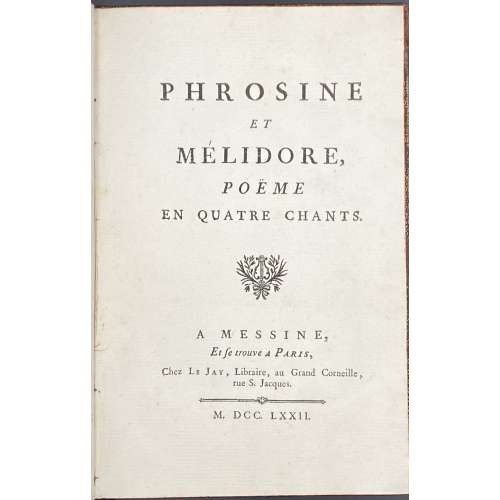 Title page: PHROSINE | ET | MELIDORE, | POËME | EN QUATRE CHANTS. | A MESSINE, | Et se trouve A Paris, | Chez Le Jay, Libraire, au Grand Corneille, | rue S. Jacques. | M. DCC. LXXII. || Pagination : ffl, [2] – h.t. / blank, [2] t.p. / blank, [1] 2-55 [56 blank], bfl ; 4 copperplate engravings by Nicolas Ponce (French, 1746 – 1831) after Charles Eisen (French, 1720 – 1778), one before each chant. Collation: 8vo; π2 (h.t., t.p. ) A-C8 D4. Binding: 20.5 x 14 cm, full mottled calf, gilt-ruled with triple fillet, flat spine, gilt in compartments, black label with gilt lettering, printed on laid paper, all edges red. Catalogue raisonné: Cohen de Ricci p. 132; J. Lewine: p. 53. Contributors: Nicolas Ponce (French, 1746 – 1831) Jean Charles Baquoy (French, 1721–1777) Charles-Dominique-Joseph Eisen (French, 1720 – 1778) Pierre-Joseph Bernard [Gentil-Bernard] (French, 1708 – 1775).
Title page: PHROSINE | ET | MELIDORE, | POËME | EN QUATRE CHANTS. | A MESSINE, | Et se trouve A Paris, | Chez Le Jay, Libraire, au Grand Corneille, | rue S. Jacques. | M. DCC. LXXII. || Pagination : ffl, [2] – h.t. / blank, [2] t.p. / blank, [1] 2-55 [56 blank], bfl ; 4 copperplate engravings by Nicolas Ponce (French, 1746 – 1831) after Charles Eisen (French, 1720 – 1778), one before each chant. Collation: 8vo; π2 (h.t., t.p. ) A-C8 D4. Binding: 20.5 x 14 cm, full mottled calf, gilt-ruled with triple fillet, flat spine, gilt in compartments, black label with gilt lettering, printed on laid paper, all edges red. Catalogue raisonné: Cohen de Ricci p. 132; J. Lewine: p. 53. Contributors: Nicolas Ponce (French, 1746 – 1831) Jean Charles Baquoy (French, 1721–1777) Charles-Dominique-Joseph Eisen (French, 1720 – 1778) Pierre-Joseph Bernard [Gentil-Bernard] (French, 1708 – 1775). -
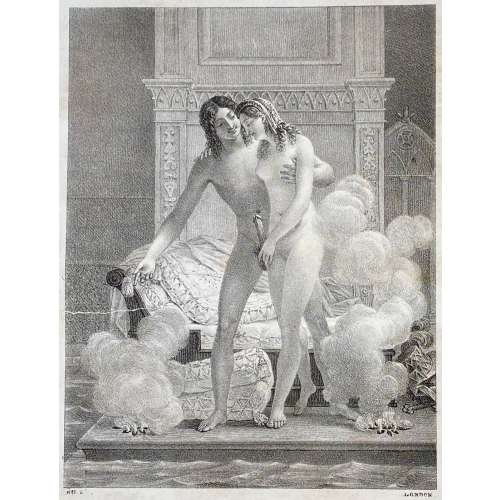 Description: Two volumes in one, collated 4to, 32.5 x 25.3 cm, bound in 19th-century long-grain green shagreen, flapped portfolio with a bronze lock clasp, gilt centrepiece fleuron, gilt- and blind-tooled boards and spine, spine with false raised bands, gilt-lettered "ESSAI | SUR LA MORALE"; text printed on bluish laid paper, blue marbled pastedowns; h.t. and t.p. in both volumes present. Restoration and conservation by Zukor art conservation in September 2022. Title-page: LA PUCELLE | D'ORLÉANS, | POËME EN VINGT-UN CHANTS. | Par VOLTAIRE | Édition ornée de Figures gravées par les meilleurs | Artistes de Paris. | — | TOME PREMIER (TOME SECOND). | — | A PARIS, | DE L’IMPRIMERIE DE DIDOT LE JEUNE. | L’AN TROISIÈME. || Imprint: A PARIS, | Chez les Frères Jacquenod, rue de Condé, no. 15. | A LYON, chez les mêmes. || Collation: Vol. 1: A-Z4, 2A-2H4 2I2; total 126 leaves; Vol. 2: A-Z4, 2A4 2B2, 2C-D4, 2E3 2F-2N4; total 141 leaves; first and last blank, plus 21 plates extraneous to collation, 8 in the 1st volume (incl. frontispiece) and 13 in the 2nd. Pagination: Vol. 1: [1-5] 6-251 [252], total 252 pages, ils; Note: leave 2A1 has a loss of 1/6 of the top, leave 2A2 torn out completely; Vol. 2: [1-5] 6-212, 2[211] 2212 [213] 214-279 [280], duplication of numbers 211 and 212 => total 282 pages, ils. The total number of pages in the volume is 534; one page torn out (187/8 in Vol. 1) Catalogue raisonné: Nordmann (2): № 562, p. 278; Cohen-deRicci: 1034. According to Nordmann (Christie’s), it was an edition illustrated with 21 plates after Lebarbier, Marillier, Monnet and Monsiau produced by various engravers; in the 1840s those plates were replaced with 24 lithographs by Achille Devéria, who signed them “LONDON”. In Nordmann’s copy, there is also a set of hand-coloured lithographs. There are only 21 plates in our copy, lacking three as per the source. Contributors : François Marie Arouet de Voltaire (French, 1694 – 1778) – author. Achille Devéria (French, 1800 – 1857) – artist. Pierre-Nicolas-Firmin Didot [Didot le Jeune] (French, 1769 – 1836) – publisher.
Description: Two volumes in one, collated 4to, 32.5 x 25.3 cm, bound in 19th-century long-grain green shagreen, flapped portfolio with a bronze lock clasp, gilt centrepiece fleuron, gilt- and blind-tooled boards and spine, spine with false raised bands, gilt-lettered "ESSAI | SUR LA MORALE"; text printed on bluish laid paper, blue marbled pastedowns; h.t. and t.p. in both volumes present. Restoration and conservation by Zukor art conservation in September 2022. Title-page: LA PUCELLE | D'ORLÉANS, | POËME EN VINGT-UN CHANTS. | Par VOLTAIRE | Édition ornée de Figures gravées par les meilleurs | Artistes de Paris. | — | TOME PREMIER (TOME SECOND). | — | A PARIS, | DE L’IMPRIMERIE DE DIDOT LE JEUNE. | L’AN TROISIÈME. || Imprint: A PARIS, | Chez les Frères Jacquenod, rue de Condé, no. 15. | A LYON, chez les mêmes. || Collation: Vol. 1: A-Z4, 2A-2H4 2I2; total 126 leaves; Vol. 2: A-Z4, 2A4 2B2, 2C-D4, 2E3 2F-2N4; total 141 leaves; first and last blank, plus 21 plates extraneous to collation, 8 in the 1st volume (incl. frontispiece) and 13 in the 2nd. Pagination: Vol. 1: [1-5] 6-251 [252], total 252 pages, ils; Note: leave 2A1 has a loss of 1/6 of the top, leave 2A2 torn out completely; Vol. 2: [1-5] 6-212, 2[211] 2212 [213] 214-279 [280], duplication of numbers 211 and 212 => total 282 pages, ils. The total number of pages in the volume is 534; one page torn out (187/8 in Vol. 1) Catalogue raisonné: Nordmann (2): № 562, p. 278; Cohen-deRicci: 1034. According to Nordmann (Christie’s), it was an edition illustrated with 21 plates after Lebarbier, Marillier, Monnet and Monsiau produced by various engravers; in the 1840s those plates were replaced with 24 lithographs by Achille Devéria, who signed them “LONDON”. In Nordmann’s copy, there is also a set of hand-coloured lithographs. There are only 21 plates in our copy, lacking three as per the source. Contributors : François Marie Arouet de Voltaire (French, 1694 – 1778) – author. Achille Devéria (French, 1800 – 1857) – artist. Pierre-Nicolas-Firmin Didot [Didot le Jeune] (French, 1769 – 1836) – publisher. -
 Print by Katsukawa Shun'ei that presumably depicts a kabuki actor Ichikawa Monnosuke II. I was not able to find any reference of the image. Size: Hosoban. SOLD
Print by Katsukawa Shun'ei that presumably depicts a kabuki actor Ichikawa Monnosuke II. I was not able to find any reference of the image. Size: Hosoban. SOLD -
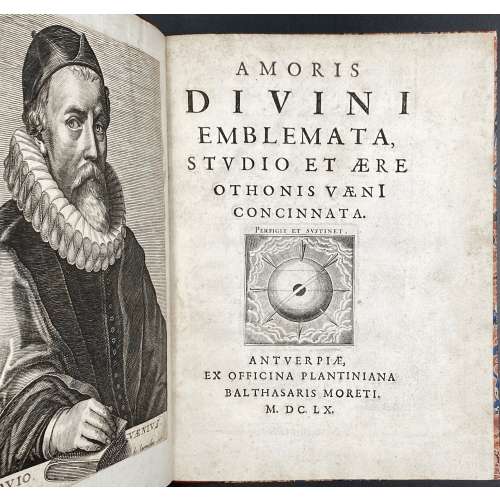 Amoris Divini Emblemata, Studio Et Aere Othonis Vaeni Concinata. — Antverpiae: Ex Officina Plantiniana Balthasaris Moreti, MDCLX [1660]. — pp.: [1] (Van Veen port.), [1] title, [2] (Isabella port.), 3-127 [1], 60 illustr. — 2nd impression. Octavius Vaenius, a.k.a. Otto Vaenius or Otto Van Veen (c. 1556-1629) was Rubens's last and most influential teacher. The Amoris divini emblemata was first published in 1615 by Nutius & Meursius in Antwerp. Vaenius’s book was to influence Herman Hugo's Pia desideria (LIB-1657.2018). Book structure: On frontispiece, trimmed and mounted portrait of Octavius Vaenius painted by his daughter Gertruida van Veen (signed Gertrudis filia) and engraved by Nicolas de Larmessin. Trimmed portrait of the Infanta Isabella Clara of Austria (1566 – 1633) pained by Peter Paul Rubens and engraved by Jan de Leeuw mounted to title verso. 60 engraved plates with emblems are on recto pages with facing texts: Latin quotations from Bible and Fathers, Spanish verses by Alphonso de Ledesma, Dutch by Vaenius and French by Carolus Philippus Hattron (d. 1632). Rebound in the mid-19th century in brown quarter Morocco with blind marbled boards and gilt lettering to spine. Inscription in ink on verso to van Veen portrait: "I bought this volume with the portraits inserted at the sale of the library of my uncle Samuel Rogers, Esq." Signed: "Frederick Sharpe, 1856". Frederick Sharpe (born was a son of Samuel Sharpe (1799–1881), the nephew of Samuel Rogers (1763–1855), a celebrated English poet. Size: 23.3 x 17.9 cm. Ref.: Emblem Project Utrecht (with an explanation of all the emblems); PETER BOOTHUYGENS: Similar or Dissimilar Loves?
Amoris Divini Emblemata, Studio Et Aere Othonis Vaeni Concinata. — Antverpiae: Ex Officina Plantiniana Balthasaris Moreti, MDCLX [1660]. — pp.: [1] (Van Veen port.), [1] title, [2] (Isabella port.), 3-127 [1], 60 illustr. — 2nd impression. Octavius Vaenius, a.k.a. Otto Vaenius or Otto Van Veen (c. 1556-1629) was Rubens's last and most influential teacher. The Amoris divini emblemata was first published in 1615 by Nutius & Meursius in Antwerp. Vaenius’s book was to influence Herman Hugo's Pia desideria (LIB-1657.2018). Book structure: On frontispiece, trimmed and mounted portrait of Octavius Vaenius painted by his daughter Gertruida van Veen (signed Gertrudis filia) and engraved by Nicolas de Larmessin. Trimmed portrait of the Infanta Isabella Clara of Austria (1566 – 1633) pained by Peter Paul Rubens and engraved by Jan de Leeuw mounted to title verso. 60 engraved plates with emblems are on recto pages with facing texts: Latin quotations from Bible and Fathers, Spanish verses by Alphonso de Ledesma, Dutch by Vaenius and French by Carolus Philippus Hattron (d. 1632). Rebound in the mid-19th century in brown quarter Morocco with blind marbled boards and gilt lettering to spine. Inscription in ink on verso to van Veen portrait: "I bought this volume with the portraits inserted at the sale of the library of my uncle Samuel Rogers, Esq." Signed: "Frederick Sharpe, 1856". Frederick Sharpe (born was a son of Samuel Sharpe (1799–1881), the nephew of Samuel Rogers (1763–1855), a celebrated English poet. Size: 23.3 x 17.9 cm. Ref.: Emblem Project Utrecht (with an explanation of all the emblems); PETER BOOTHUYGENS: Similar or Dissimilar Loves? -
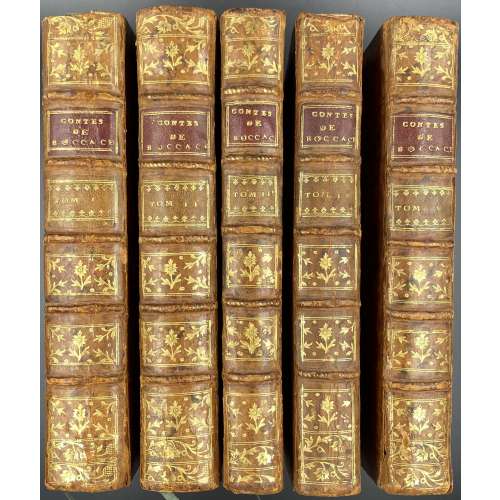 Five volumes, uniformly bound in marbled three-colour stained polished calf, spine with raised bands, gilt in compartments, crimson label with gilt lettering “CONTES DE BOCCACE”, cream label with volume number, marbled endpapers and all edges; bookplate pasted to first blank flyleaf “BIBLIOTHÈQUE DE LAJUDIE” depicting a coat of arms over an anchor, anchors and tulips scattered in the upper section, globe in the lower section, in a frame. Size: 21 x 14 cm. Translated by Antoine Le Maçon (French, 1500? – 1559). Vol. 1: [4] two blank leaves, portrait by Louis Lempereur after Hubert Gravelot, engraved t.p.: LE | DECAMERON | DE JEAN | BOCCACE. | TOME I. | Londres | 1757. | H. Gravelot Inv. […] T.P. N 21 […] J. Aliamet Sculp. ||, engraved frontispiece to Vie de Jean Bocace by Lempereur after Gravelot; Pagination: [i] ii-viii (Vie de Jean Bocace with head- and tail-pieces); [1] 2-320 [2] one blank leaf. Collation: 8vo; a4 A-V8, 164 leaves + 6 blanks + 24 plates (incl. portrait, frontis., and t.p.) extraneous to collation, 1 headpiece and 18 tailpieces. Vol. 2: [4] two blank leaves, engraved t.p.: LE | DECAMERON | DE JEAN | BOCCACE. | TOME II. | Londres 1757 | H. Gravelot inv. […] T.II. N.1. […] N. LeMire Sculp .||; Pagination: [1] 2-292 [2] one blank leaf. Collation: 8vo; A-S8 T2, 146 leaves + 3 blanks + 23 plates (incl. t.p.) extraneous to collation, and 18 tailpieces. Vol. 3: [4] two blank leaves, engraved t.p.: LE | DECAMERON | DE JEAN | BOCCACE. | TOME III. | Londres 1757 | Gravelot inv. […] T.III. N.1. […] Aillamet Sc. ||; Pagination: [1] 2-203 [204] [2] one blank leaf. Collation: 8vo; A-M8 N6, 102 leaves + 3 blanks + 23 plates (incl. t.p.) extraneous to collation, and 18 tailpieces. Vol. 4: [4] two blank leaves, engraved t.p.: LE | DECAMERON | DE JEAN | BOCCACE. | TOME IV. | Lond 1761 | Gravelot invenit […] T.IV. №.I. […] Alliamet Sculpsit. ||; Pagination: [1] 2-280 [2] one blank leaf. Collation: 8vo; A-R8 S4, 140 leaves + 3 blanks + 23 plates (incl. t.p.) extraneous to collation, and 20 tailpieces. Vol. 5: [4] two blank leaves, engraved t.p.: LE | DECAMERON | DE JEAN | BOCCACE. | TOME V. | Londres 1761 | Gravelot, inv. […] T.V. N.1. […] Aillamet Sc. ||; Pagination: [1] 2 [3] 4-269 [270] [2] one blank leaf. Collation: 8vo; A-Q8 R7, 135 leaves + 3 blanks + 23 plates (incl. t.p.) extraneous to collation, and 22 tailpieces. Total plates: 24+23+23+23+23=112; total vignettes: 19+ 18 + 18 +20 + 22 = 94; total etchings and engravings: 213. Ref: MFA ACCESSION NUMBER 37.1371a-e; Cohen-de Ricci 160; Ray, French Illustrated Book, 15 / p. 39-41; Metropolitan Museum, NY (Accession Number: 17.3.2641). Contributors: Authors: Giovanni Boccaccio (Italian, 1313–1375); Filippo Villani [Philippe-Matthieu Villani] (Italian, 1325 – 1407)Illustrated by: Hubert François Gravelot (French, 1699–1773). Artists: Charles Eisen (French, 1720–1778); François Boucher (French, 1703–1770); Charles-Nicolas Cochin le fils (French, 1715–1790), Jacques Aliamet (French, 1726–1788) Engravers: Jean Charles Baquoy (French, 1721–1777); Jean Jacques Flipart (French, 1719–1782); Louis Legrand (French, 1723–1807); Noël Le Mire (French, 1724–1801); Louis Simon Lempereur (French, 1725–1796); Catherine Elisabeth (Cousinet) Lempereur (French, born in 1726); Jean-Jacques André Le Veau (French, 1729–1786); Pierre Etienne Moitte (French, 1722–1780); Jean Ouvrier (French, 1725–1784); Jean Jacques Pasquier (French, died in 1785); Pierre (Pitre) Martenasie (Flemish, worked in France, died in 1770?); Augustin de Saint-Aubin (French, 1736–1807); Dominique Sornique (French, 1708 – 1756); Jacques Nicolas Tardieu (French, 1716–1791). Publisher: Prault (French, 18th century) Note: MFA copy has a slightly different collation: [v. 1] 152 leaves, plus plates; [v. 2] 136 ll., plus pls.; [v. 3] 98 ll., plus pls.; [v. 4] 131 ll., plus pls.; [v. 5] 124 ll., plus pls. This is their description: "First edition with these illustrations; a French translation (Cohen-de Ricci 160) appeared slightly later. Gravelot designed 89 of the 111 plates, and all 97 of the tailpieces, his largest single commission. Some 115 of his preliminary sketches by this series are in the Rosenwald Collection, Library of Congress; 131 of the final engraver's models are in the Widener Collection at the National Gallery of Art; and two other finished drawings are in the Ray Collection, Pierpont Morgan Library. Ten plates were designed by Eisen, and Cochin and Boucher had six each. As some plates in the later volumes are dated as late as 1761, the actual issuing of the volumes apparently extended to that date."
Five volumes, uniformly bound in marbled three-colour stained polished calf, spine with raised bands, gilt in compartments, crimson label with gilt lettering “CONTES DE BOCCACE”, cream label with volume number, marbled endpapers and all edges; bookplate pasted to first blank flyleaf “BIBLIOTHÈQUE DE LAJUDIE” depicting a coat of arms over an anchor, anchors and tulips scattered in the upper section, globe in the lower section, in a frame. Size: 21 x 14 cm. Translated by Antoine Le Maçon (French, 1500? – 1559). Vol. 1: [4] two blank leaves, portrait by Louis Lempereur after Hubert Gravelot, engraved t.p.: LE | DECAMERON | DE JEAN | BOCCACE. | TOME I. | Londres | 1757. | H. Gravelot Inv. […] T.P. N 21 […] J. Aliamet Sculp. ||, engraved frontispiece to Vie de Jean Bocace by Lempereur after Gravelot; Pagination: [i] ii-viii (Vie de Jean Bocace with head- and tail-pieces); [1] 2-320 [2] one blank leaf. Collation: 8vo; a4 A-V8, 164 leaves + 6 blanks + 24 plates (incl. portrait, frontis., and t.p.) extraneous to collation, 1 headpiece and 18 tailpieces. Vol. 2: [4] two blank leaves, engraved t.p.: LE | DECAMERON | DE JEAN | BOCCACE. | TOME II. | Londres 1757 | H. Gravelot inv. […] T.II. N.1. […] N. LeMire Sculp .||; Pagination: [1] 2-292 [2] one blank leaf. Collation: 8vo; A-S8 T2, 146 leaves + 3 blanks + 23 plates (incl. t.p.) extraneous to collation, and 18 tailpieces. Vol. 3: [4] two blank leaves, engraved t.p.: LE | DECAMERON | DE JEAN | BOCCACE. | TOME III. | Londres 1757 | Gravelot inv. […] T.III. N.1. […] Aillamet Sc. ||; Pagination: [1] 2-203 [204] [2] one blank leaf. Collation: 8vo; A-M8 N6, 102 leaves + 3 blanks + 23 plates (incl. t.p.) extraneous to collation, and 18 tailpieces. Vol. 4: [4] two blank leaves, engraved t.p.: LE | DECAMERON | DE JEAN | BOCCACE. | TOME IV. | Lond 1761 | Gravelot invenit […] T.IV. №.I. […] Alliamet Sculpsit. ||; Pagination: [1] 2-280 [2] one blank leaf. Collation: 8vo; A-R8 S4, 140 leaves + 3 blanks + 23 plates (incl. t.p.) extraneous to collation, and 20 tailpieces. Vol. 5: [4] two blank leaves, engraved t.p.: LE | DECAMERON | DE JEAN | BOCCACE. | TOME V. | Londres 1761 | Gravelot, inv. […] T.V. N.1. […] Aillamet Sc. ||; Pagination: [1] 2 [3] 4-269 [270] [2] one blank leaf. Collation: 8vo; A-Q8 R7, 135 leaves + 3 blanks + 23 plates (incl. t.p.) extraneous to collation, and 22 tailpieces. Total plates: 24+23+23+23+23=112; total vignettes: 19+ 18 + 18 +20 + 22 = 94; total etchings and engravings: 213. Ref: MFA ACCESSION NUMBER 37.1371a-e; Cohen-de Ricci 160; Ray, French Illustrated Book, 15 / p. 39-41; Metropolitan Museum, NY (Accession Number: 17.3.2641). Contributors: Authors: Giovanni Boccaccio (Italian, 1313–1375); Filippo Villani [Philippe-Matthieu Villani] (Italian, 1325 – 1407)Illustrated by: Hubert François Gravelot (French, 1699–1773). Artists: Charles Eisen (French, 1720–1778); François Boucher (French, 1703–1770); Charles-Nicolas Cochin le fils (French, 1715–1790), Jacques Aliamet (French, 1726–1788) Engravers: Jean Charles Baquoy (French, 1721–1777); Jean Jacques Flipart (French, 1719–1782); Louis Legrand (French, 1723–1807); Noël Le Mire (French, 1724–1801); Louis Simon Lempereur (French, 1725–1796); Catherine Elisabeth (Cousinet) Lempereur (French, born in 1726); Jean-Jacques André Le Veau (French, 1729–1786); Pierre Etienne Moitte (French, 1722–1780); Jean Ouvrier (French, 1725–1784); Jean Jacques Pasquier (French, died in 1785); Pierre (Pitre) Martenasie (Flemish, worked in France, died in 1770?); Augustin de Saint-Aubin (French, 1736–1807); Dominique Sornique (French, 1708 – 1756); Jacques Nicolas Tardieu (French, 1716–1791). Publisher: Prault (French, 18th century) Note: MFA copy has a slightly different collation: [v. 1] 152 leaves, plus plates; [v. 2] 136 ll., plus pls.; [v. 3] 98 ll., plus pls.; [v. 4] 131 ll., plus pls.; [v. 5] 124 ll., plus pls. This is their description: "First edition with these illustrations; a French translation (Cohen-de Ricci 160) appeared slightly later. Gravelot designed 89 of the 111 plates, and all 97 of the tailpieces, his largest single commission. Some 115 of his preliminary sketches by this series are in the Rosenwald Collection, Library of Congress; 131 of the final engraver's models are in the Widener Collection at the National Gallery of Art; and two other finished drawings are in the Ray Collection, Pierpont Morgan Library. Ten plates were designed by Eisen, and Cochin and Boucher had six each. As some plates in the later volumes are dated as late as 1761, the actual issuing of the volumes apparently extended to that date." -
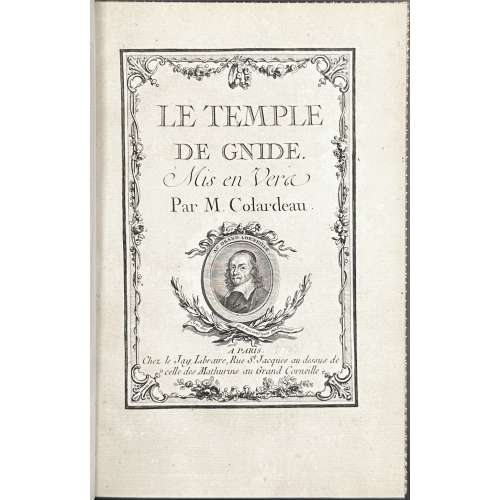 Hardcover volume, 8vo, 21.5 x 14.5 cm, bound by Riviere & Son (stamped on fep verso bottom) in full brown calf, boards with triple gilt fillet border and gilt dentelle inside, spine with raised bands, gilt in compartments, black label with gilt lettering, all margins gilt, blue endpapers, bookplate of Arthur Rau pasted to front pastedown (text: Les hommes sont méchants mais leurs livres sont bons / Arthur Rau; signed: E. H. New – A.D. 1922), traces of removed owner’s label to fep recto; printed on laid paper. Title-page (engraved, in floral frame): LE TEMPLE | DE GNIDE. | Mis en Vers | Par M. Colardeau | {vignette with portrait of Pierre Corneille} | A PARIS | Chez le Jay, Libraire, Rue St. Jacques au dessus de | celle des Mathurins au Grand Corneille || Collation: 2 blanks, h.t., engraved t.p. with a portrait of Pierre Corneille, a8, A-E8 F4 (52 leaves), 2 blanks, plus 7 plates by various engravers after Charles Monnet. Pagination: [i] ii-xvi, [1] 2-88 (104 pp). Ref: MFA (Boston): accession number 37.1747 Catalogue raisonné: Lewine 114, Cohen-DeRicci 245-6. Contributors: Charles Monnet (French, 1732 – after 1808) – artist. Engravers: Jean Charles Baquoy (French, 1721 – 1777) Nicolas Delaunay (French, 1739 – 1792) Isidore Stanislas Helman (French, 1743 – 1806) Louis Joseph Masquelier (French, 1741 – 1811) François Denis Née (French, 1735 – 1818) Nicholas Ponce (French, 1746 – 1831) Portrait(s) designed by: Guillaume Voiriot (French, 1713 – 1799) Author: Charles-Pierre Colardeau (French, 1732 – 1776) Publisher: Edmé-Jean Le Jay (French, 1734 – 1795) Bookplate artist: Edmund Hort New (British, 1871 – 1931) Provenance: Arthur Rau (British, 1898 – 1972); his obituary can be found in The Book Collector 1973, vol. 22, n°1, p. 86-89. According to the genealogy service Geni, Arthur Aron Rau was born to Jacob Aryeh Rau and Katharina (Kaethe) Rau, and has a sister Cecilia (Tsipporah) Rosenfelder and a brother Frederick Solomon Rau. He went to Oxford and then joined Maggs Brothers in their Paris establishment. "After some years there, he set up on his own, returning to England at the outbreak of the Second World War to be a schoolmaster for ten years". In 1949 he returned to Paris and retired in 1963, "and his last years he happily spent in Wensleydale...". All he published during his lifetime were two catalogues, Livres Rares Et Anciens. Manuscrits et Autographes. — Paris: Arthur Rau, 1932-3 and Cinquante Tres Beaux Livres Avec Un Appendice. — Paris: Arthur Rau, 1933. He also contributed to The Book Collector.Seller’s description: In-8° : [2]-t. gr.-xvi-88 pp. ; 7 h.-t. (qqs rouss.). - Poème d'après le roman de Montesquieu ill. de 7 eaux-fortes par Bacquoy, Delaunay, Née, etc., d'après Charles Monnet. Titre gr. orné d'un portr. de Corneille. Cohen, qui cite un ex. millésimé 1773, signale des ex. avec la date de 1772 ou sans date. - Réf. Cohen 245-246. - Conlon 72:675 (éd. à l'adresse d'Amsterdam et Paris, 1772). - Pas dans Reynaud. - Prov. Arthur Rau (1898-1972), gérant de la librairie Maggs à Paris avant d'ouvrir sa propre librairie en 1932 (ex-libris gr. par E.H. New, 1922 ; réf. BnF). - Traces d'ex-libris décollé à la garde sup.
Hardcover volume, 8vo, 21.5 x 14.5 cm, bound by Riviere & Son (stamped on fep verso bottom) in full brown calf, boards with triple gilt fillet border and gilt dentelle inside, spine with raised bands, gilt in compartments, black label with gilt lettering, all margins gilt, blue endpapers, bookplate of Arthur Rau pasted to front pastedown (text: Les hommes sont méchants mais leurs livres sont bons / Arthur Rau; signed: E. H. New – A.D. 1922), traces of removed owner’s label to fep recto; printed on laid paper. Title-page (engraved, in floral frame): LE TEMPLE | DE GNIDE. | Mis en Vers | Par M. Colardeau | {vignette with portrait of Pierre Corneille} | A PARIS | Chez le Jay, Libraire, Rue St. Jacques au dessus de | celle des Mathurins au Grand Corneille || Collation: 2 blanks, h.t., engraved t.p. with a portrait of Pierre Corneille, a8, A-E8 F4 (52 leaves), 2 blanks, plus 7 plates by various engravers after Charles Monnet. Pagination: [i] ii-xvi, [1] 2-88 (104 pp). Ref: MFA (Boston): accession number 37.1747 Catalogue raisonné: Lewine 114, Cohen-DeRicci 245-6. Contributors: Charles Monnet (French, 1732 – after 1808) – artist. Engravers: Jean Charles Baquoy (French, 1721 – 1777) Nicolas Delaunay (French, 1739 – 1792) Isidore Stanislas Helman (French, 1743 – 1806) Louis Joseph Masquelier (French, 1741 – 1811) François Denis Née (French, 1735 – 1818) Nicholas Ponce (French, 1746 – 1831) Portrait(s) designed by: Guillaume Voiriot (French, 1713 – 1799) Author: Charles-Pierre Colardeau (French, 1732 – 1776) Publisher: Edmé-Jean Le Jay (French, 1734 – 1795) Bookplate artist: Edmund Hort New (British, 1871 – 1931) Provenance: Arthur Rau (British, 1898 – 1972); his obituary can be found in The Book Collector 1973, vol. 22, n°1, p. 86-89. According to the genealogy service Geni, Arthur Aron Rau was born to Jacob Aryeh Rau and Katharina (Kaethe) Rau, and has a sister Cecilia (Tsipporah) Rosenfelder and a brother Frederick Solomon Rau. He went to Oxford and then joined Maggs Brothers in their Paris establishment. "After some years there, he set up on his own, returning to England at the outbreak of the Second World War to be a schoolmaster for ten years". In 1949 he returned to Paris and retired in 1963, "and his last years he happily spent in Wensleydale...". All he published during his lifetime were two catalogues, Livres Rares Et Anciens. Manuscrits et Autographes. — Paris: Arthur Rau, 1932-3 and Cinquante Tres Beaux Livres Avec Un Appendice. — Paris: Arthur Rau, 1933. He also contributed to The Book Collector.Seller’s description: In-8° : [2]-t. gr.-xvi-88 pp. ; 7 h.-t. (qqs rouss.). - Poème d'après le roman de Montesquieu ill. de 7 eaux-fortes par Bacquoy, Delaunay, Née, etc., d'après Charles Monnet. Titre gr. orné d'un portr. de Corneille. Cohen, qui cite un ex. millésimé 1773, signale des ex. avec la date de 1772 ou sans date. - Réf. Cohen 245-246. - Conlon 72:675 (éd. à l'adresse d'Amsterdam et Paris, 1772). - Pas dans Reynaud. - Prov. Arthur Rau (1898-1972), gérant de la librairie Maggs à Paris avant d'ouvrir sa propre librairie en 1932 (ex-libris gr. par E.H. New, 1922 ; réf. BnF). - Traces d'ex-libris décollé à la garde sup. -
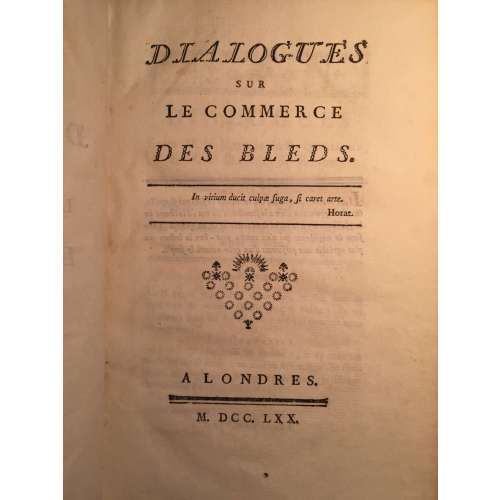
GALIANI, Ferdinando, Abbé. Dialogue sur le commerce des bleds. Londres, 1770. L'Abbé Roubaud, Pierre Joseph André. Récréations économiques ou lettres de l'auteur des représentations aux magistrats, a M. le chevalier Zanobi, principal interlocuteur des Dialogues sur le commerce des bleds; Amsterdam & Paris, Delalain, 1770. Béguillet, Edme. De principiis vegetationis et agreculturae et de causis triplicis culturae in Burgundia disquisitio physica. Auctore E.B.D. ex Societate Œconomica Lugdunensi; Divione, 1768.
-
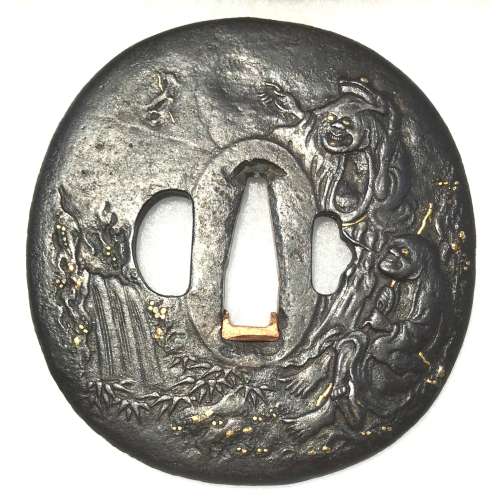
Iron tsuba of oval form with the design of two immortals (Gama Sennin with the toad upon his head and Tekkai Sennin with his iron crutch) beside a waterfall carved in low relief with a high relief effect (takabori) and with details inlaid in gold. A waterfall carved on the reverse. Nakago-ana is plugged with copper sekigane. Unsigned. Allegedly, Mito School.
Edo period, ca. 1700.
Size: Height: 87.0 mm; Width: 82.8 mm; Thickness: 4.4 mm; Weight: 179 g.
No longer available. -
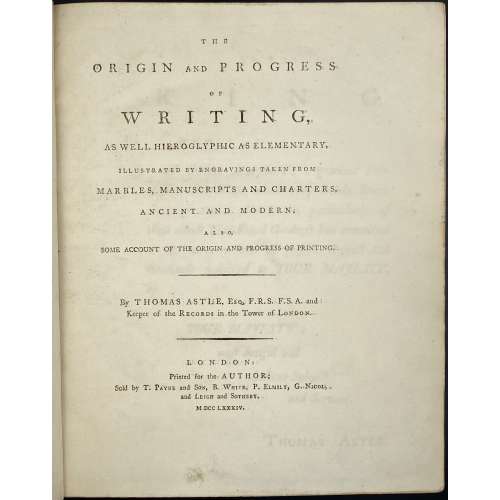 Full Title: THE | ORIGIN AND PROGRESS | OF | WRITING, | AS WELL HIEROGLYPHIC AS ELEMENTARY, | ILLUSTRATED BY ENGRAVINGS TAKEN FROM | MARBLES, MANUSCRIPTS AND CHARTERS, | ANCIENT AND MODERN. | ALSO, | SOME ACCOUNT OF THE ORIGIN AND PROGRESS OF PRINTING. | – | By THOMAS ASTLE, Esq. F.R.S. F.S.A. and | Keeper of the RECORDS in the Tower of LONDON. | – | LONDON: | Printed for the AUTHOR; | Sold by T. PAYNE and SON, B. White, P. Elmsly, G. Nicol, | and LEIGH and SOTHEBY. | M DCC LXXXIV. Pagination: ffl [i, ii] - t.p., blank, [iii, iv] - dedication, blank, [v] vi, vii - contents, [viii] - blank; [i] -xxv - introduction, [xxvi] blank; 1 - of the origin and progress... - 235 [236] blank (229-235 additions and corrections); on p. 235 imprint: FROM THE PRESS OF J. NICHOLS, MDCCLXXXIV; bfl; 31 plates: op. p. 64 (folding), 66, 70, 72 (2), 76, 80 (2, on recto and verso), 82 (2, on recto and verso), 84, 92, 94, 96 (folding), 98 (folding), 100, 102, 104 (folding), 106 (folding), 108 (folding), 112 (folding), 128 (folding), 140 (2, on recto and verso), 142, 146, 150 (folding), 158, 160, 176, 178, folding platessigned "B. T. Pouncy". Collation: [A4] a–c4 π1 B-Z4 Aa-Ff4 Gg2 Hh4. Size: 4to, 29.1 x 24.3 cm. Binding: contemporary full polished brown calf professionally re-backed, single-fillet gilt border to covers, raised bands, black title label with gilt lettering and gilt fillets, gilt year lettering to bottom. Printed on laid paper, margins marbled. Bookplates: "Alex-r Carlile" to front pastedown, "Nicholas Wall. Sometime his book" to back pastedown. To front pastedown: pencil inscriptions and pasted clipping about the book.
Full Title: THE | ORIGIN AND PROGRESS | OF | WRITING, | AS WELL HIEROGLYPHIC AS ELEMENTARY, | ILLUSTRATED BY ENGRAVINGS TAKEN FROM | MARBLES, MANUSCRIPTS AND CHARTERS, | ANCIENT AND MODERN. | ALSO, | SOME ACCOUNT OF THE ORIGIN AND PROGRESS OF PRINTING. | – | By THOMAS ASTLE, Esq. F.R.S. F.S.A. and | Keeper of the RECORDS in the Tower of LONDON. | – | LONDON: | Printed for the AUTHOR; | Sold by T. PAYNE and SON, B. White, P. Elmsly, G. Nicol, | and LEIGH and SOTHEBY. | M DCC LXXXIV. Pagination: ffl [i, ii] - t.p., blank, [iii, iv] - dedication, blank, [v] vi, vii - contents, [viii] - blank; [i] -xxv - introduction, [xxvi] blank; 1 - of the origin and progress... - 235 [236] blank (229-235 additions and corrections); on p. 235 imprint: FROM THE PRESS OF J. NICHOLS, MDCCLXXXIV; bfl; 31 plates: op. p. 64 (folding), 66, 70, 72 (2), 76, 80 (2, on recto and verso), 82 (2, on recto and verso), 84, 92, 94, 96 (folding), 98 (folding), 100, 102, 104 (folding), 106 (folding), 108 (folding), 112 (folding), 128 (folding), 140 (2, on recto and verso), 142, 146, 150 (folding), 158, 160, 176, 178, folding platessigned "B. T. Pouncy". Collation: [A4] a–c4 π1 B-Z4 Aa-Ff4 Gg2 Hh4. Size: 4to, 29.1 x 24.3 cm. Binding: contemporary full polished brown calf professionally re-backed, single-fillet gilt border to covers, raised bands, black title label with gilt lettering and gilt fillets, gilt year lettering to bottom. Printed on laid paper, margins marbled. Bookplates: "Alex-r Carlile" to front pastedown, "Nicholas Wall. Sometime his book" to back pastedown. To front pastedown: pencil inscriptions and pasted clipping about the book. -
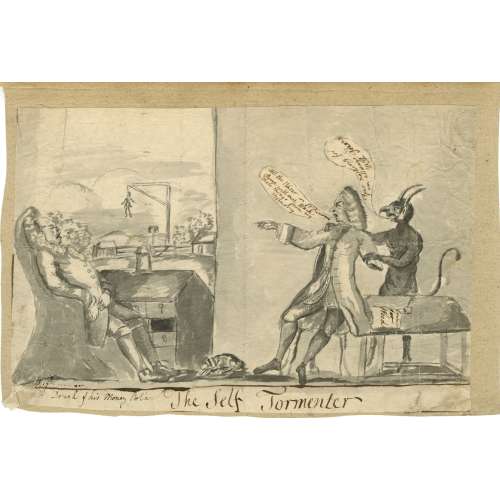 Ink drawing on watermarked paper by an anonymous artist, British or American. Original pen and ink with manuscript text. About 7 x 10-1/2 inches, Vander Ley type watermark (Churchill 321), mounted to old laid paper; several corners chipped, some creasing, soiling, etc. Np, Late 18th-century.
Ink drawing on watermarked paper by an anonymous artist, British or American. Original pen and ink with manuscript text. About 7 x 10-1/2 inches, Vander Ley type watermark (Churchill 321), mounted to old laid paper; several corners chipped, some creasing, soiling, etc. Np, Late 18th-century. -
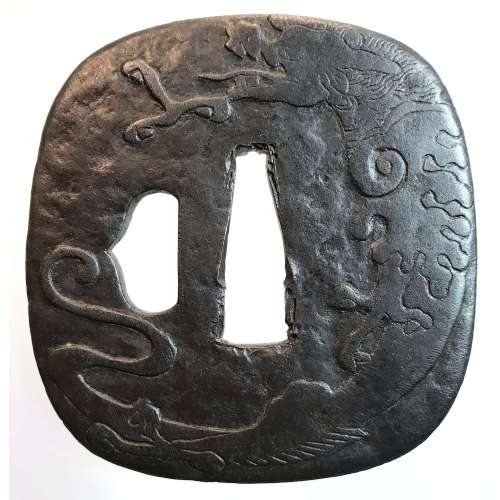 Shimizu-Jingo tsuba with a dragon and vajra (on reverse) motif. Unsigned. Possibly, 3rd or 4th master of Shimizu-Jingo family in Higo province. Iron. Low relief carving. Edo period, 1700's. Height: 75.4 mm, Width: 72.2 mm, Thickness at seppa-dai: 4.0 mm
Shimizu-Jingo tsuba with a dragon and vajra (on reverse) motif. Unsigned. Possibly, 3rd or 4th master of Shimizu-Jingo family in Higo province. Iron. Low relief carving. Edo period, 1700's. Height: 75.4 mm, Width: 72.2 mm, Thickness at seppa-dai: 4.0 mm -
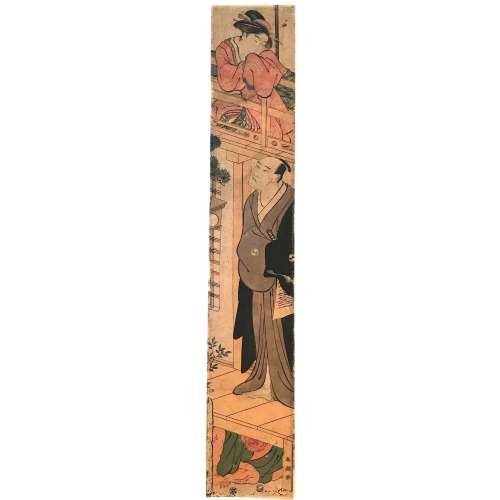 Katsukawa Shunshō ( 勝川 春章; 1726 – 19 January 1793).
Katsukawa Shunshō ( 勝川 春章; 1726 – 19 January 1793).Signed: Shunchô ga (春潮画); Censor's seal: kiwame (改印:極)
Publisher: Iwatoya Kisaburō (Eirindō); c. 1760s – 1832. Marks #173/p.169.
Reference: MFA ACCESSION NUMBER 11.21263. Not in Pins.
Act VII, Gion Ichiriki no ba ("The Ichiriki Teahouse at Gion") This act gives a taste of the bustling atmosphere of the Gion pleasure quarter in Kyoto. Yuranosuke is feigning a life of debauchery at the same teahouse to which Okaru has been indentured. Kudayū, the father of Sadakurō, arrives. He is now working for Moronō and his purpose is to discover whether Yuranosuke still plans revenge or not. He tests Yuranosuke's resolve by offering him food on the anniversary of their lord's death when he should be fasting. Yuranosuke is forced to accept. Yuranosuke's sword – the revered symbol of a samurai – is also found to be covered in rust. It would appear that Yuranosuke has no thoughts of revenge. But still unsure, Kudayū hides under the veranda. Now believing himself alone, Yuranosuke begins to read a secret letter scroll about preparations for the vendetta. On a higher balcony Okaru comes out to cool herself in the evening breeze and, noticing Yuranosuke close by, she also reads the letter reflected in her mirror. As Yuranosuke unrolls the scroll, Kudayū, too, examines the end which trails below the veranda. Suddenly, one of Okaru's hairpins drops to the floor and a shocked Yuranosuke quickly rolls up the scroll. Finding the end of the letter torn off, he realises that yet another person knows his secret and he must silence them both. Feigning merriment, he calls Okaru to come down and offers to buy out her contract. He goes off supposedly to fix the deal. Then Okaru's brother Heiemon enters and, hearing what has just happened, realises that Yuranosuke actually intends to keep her quiet by killing her. He persuades Okaru to let him kill her instead so as to save their honour and she agrees. Overhearing everything, Yuranosuke is now convinced of the pair's loyalty and stops them. He gives Okaru a sword and, guiding her hand, thrusts it through the floorboards to kill Kudayū. The main actor has to convey a wide variety of emotions between a fallen, drunkard rōnin and someone who in reality is quite different since he is only faking his weakness. This is called hara-gei or "belly acting", which means he has to perform from within to change characters. It is technically difficult to perform and takes a long time to learn, but once mastered the audience takes up on the actor's emotion. Emotions are also expressed through the colours of the costumes, a key element in kabuki. Gaudy and strong colours can convey foolish or joyful emotions, whereas severe or muted colours convey seriousness and focus. -
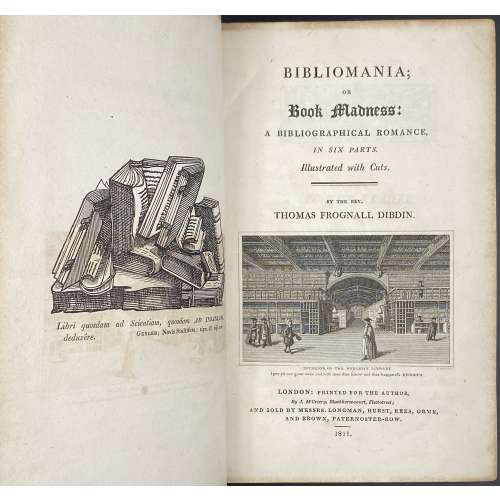 Title: BIBLIOMANIA; | OR | Book Madness: | A BIBLIOGRAPHICAL ROMANCE, | IN SIX PARTS. | Illustrated with Cuts. | BY THE REV. | THOMAS FROGNALL DIBDIN. | {vignette} | INTERIOR OF THE BODLEIAN LIBRARY | I pity all our great ones and rich men that know not this happiness. HEINSIUS. | LONDON: PRINTED FOR THE AUTHOR, | By J. McCreery, Blackhorse-court, Fleet-street; | AND SOLD BY MESSRS. LONGMAN, HURST, REES, ORME, | AND BROWN, PATERNOSTER-ROW. | 1811.|| Pagination: ffl, [i, ii] - ht, frontis., [iii, iv] - t.p., blank, [v]vi-ix - to the reader, [x] - blank, [2] - contents, [1, 2] - part 1 fl. t.p., blank, [3] - woodcut frame and capital I, 4-782 (imprint to p. 782) [2] - errata, blank, bfl; 1 plate op. p. 158. Collation: [A]6 B-Z8 2A-2Z8, 3A-3B8, 3C-3F4. Binding: 8vo, 23 x 14 cm, modern full dark brown calf by Period Binders (Bath, England), gilt fillet border to boards, raised bands with gilt ornaments and lettering to spine, pp. 685-688 an open tear in upper 1/8 of lateral margin, all margins marbled. Substantially revised 1st edition ("so much altered and enlarged, as to assume the character of a new work"). Author: Thomas Frognall Dibdin (British, 1776 – 1847).
Title: BIBLIOMANIA; | OR | Book Madness: | A BIBLIOGRAPHICAL ROMANCE, | IN SIX PARTS. | Illustrated with Cuts. | BY THE REV. | THOMAS FROGNALL DIBDIN. | {vignette} | INTERIOR OF THE BODLEIAN LIBRARY | I pity all our great ones and rich men that know not this happiness. HEINSIUS. | LONDON: PRINTED FOR THE AUTHOR, | By J. McCreery, Blackhorse-court, Fleet-street; | AND SOLD BY MESSRS. LONGMAN, HURST, REES, ORME, | AND BROWN, PATERNOSTER-ROW. | 1811.|| Pagination: ffl, [i, ii] - ht, frontis., [iii, iv] - t.p., blank, [v]vi-ix - to the reader, [x] - blank, [2] - contents, [1, 2] - part 1 fl. t.p., blank, [3] - woodcut frame and capital I, 4-782 (imprint to p. 782) [2] - errata, blank, bfl; 1 plate op. p. 158. Collation: [A]6 B-Z8 2A-2Z8, 3A-3B8, 3C-3F4. Binding: 8vo, 23 x 14 cm, modern full dark brown calf by Period Binders (Bath, England), gilt fillet border to boards, raised bands with gilt ornaments and lettering to spine, pp. 685-688 an open tear in upper 1/8 of lateral margin, all margins marbled. Substantially revised 1st edition ("so much altered and enlarged, as to assume the character of a new work"). Author: Thomas Frognall Dibdin (British, 1776 – 1847).


